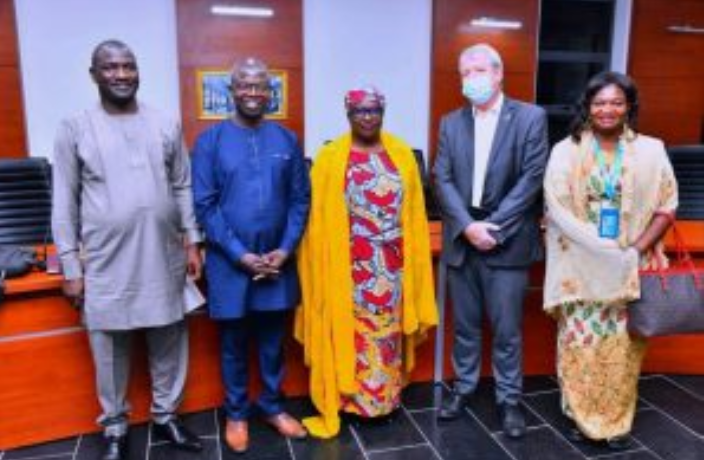Kaduna State Government says it will partner with UNICEF for a comprehensive quality service delivery to the people in the areas of health, Education and Nutrition.
The state deputy Governor, Dr Hadiza Balarabe, said this while receiving the UNICEF Representative in Nigeria, Mr Peter Hawkins, who visited him on Friday.
She said Kaduna state government is a strong unit of human capital development where its citizens are top priority.
According to the Deputy Governor, “we are looking at all issues under human capital whether it is health, education and other related areas.”
Dr Balarabe said the state has a policy council that meets every two weeks to deliberate on this issue.
She said that the state government will do more on childhood immunization. We are still not there in water and sanitation.
“Last year, we had an outbreak of cholera but we do not want this again, we will let people know that they should ensure they keep their environment clean and not to openly defecate.
“We want to have all our communities open defecation free, we have about four LGAs now certified open defecation free but we want to have the remaining 19 to also be certified,” she said.
She said Kaduna state has always been a data state because “without data much cannot be done, even planning cannot be a realistic plan.
“We drive ourselves to ensure that we get data that is reliable and realistic and we can say it’s reasonably realistic and we can base our planning on that,” she said.
Dr Balarabe also expressed the gratitude of the Kaduna State government to UNICEF for its support in many areas.
Earlier in his remarks, UNICEF Representative in Nigeria, Mr Peter Hawkins, said the visit is about partnership between UNICEF and Kaduna state government.
Hawkins said UNICEF will continue to partner with the state government with focus on children, health, education and protection and education for the children on the street and Almajiris.
They will be working with the team on documentation and identification of beneficiaries while exploring different ways of ensuring safe schools and safe school initiative in Kaduna, Hawkins said.
He said: “We could do well with the whole digitalisation and access to learning through digital means.
“As you know, the learning passport was launched months ago and which is an an online, mobile and soon-to-be offline learning platform that will provide continuous education to three million learners in 2022.
“It means that any teacher or child who has the means can access the curriculum through an app which is easy for a child.
“We have to believe in children using technology to advance themselves and teaching at the right levels which allows numeracy and literacy and integrate the Quranic school curriculum for Quranic teaching,” he said.
“We talk about education and the importance of education management information systems and safe schools and how to ensure that children are able to go to school safely and get quality education,” he said.
On the issue of out-of-school children, including those on the streets, “we are looking at informal education, and teaching at the right level for numeracy and literacy.
He said they talked about nutrition, prevention and stunting in Kaduna state, whose prevalence is said to be 32 per cent.
“But we have more work to look at like nutrients supplementation which cost N6,000 per child in their first one or two years,” Hawkins said, noting that on the issue of health, Kaduna, as one of the MoU states, is progressing very well.
“On the COVID vaccine, 55,000 persons are being vaccinated per day and this will be integrated into vaccinating children against measles and other diseases,” Hawkins indicated.
He said integration is an important part of partnership which ill strengthen partnership going forward.
